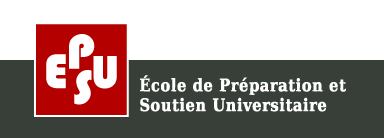Recyclage de composites thermoplastiques : formulation de compounds à propriétés maîtrisées. // Recycling of thermoplastic composites: formulation of compounds with controlled properties.
|
ABG-132540
ADUM-66545 |
Sujet de Thèse | |
| 17/06/2025 |
Université de Pau et des Pays de l'Adour
Pau - Nouvelle Aquitaine - France
Recyclage de composites thermoplastiques : formulation de compounds à propriétés maîtrisées. // Recycling of thermoplastic composites: formulation of compounds with controlled properties.
- Physique
Recyclage, Composites thermoplastiques, Mise en oeuvre, Formulation, Modélisation, Rhéologie
Recycling, Thermoplastic composites, Processing, Formulation, Modelling, Rheology
Recycling, Thermoplastic composites, Processing, Formulation, Modelling, Rheology
Description du sujet
La valorisation des déchets issus des matériaux composites représente un enjeu stratégique majeur quel que soit les domaines d'application. On peut citer tout particulièrement l'aviation civile et militaire pour laquelle la flotte vieillissante entraine une déconstruction en forte croissance (13 000 aéronefs civils et militaires attendus en fin de vie entre 2015 et 2035). Mais, c'est bien l'ensemble des domaines d'application incluant l'automobile, les éoliennes, le nautisme, la construction, les sports, … Ainsi, au-delà de la déconstruction et du recyclage complexe des matériaux utilisés historiquement, la transition vers des pièces et structures plus écologiques et performantes est essentielle pour répondre aux défis futurs. Dans ce cadre global, les matériaux composites à matrice thermoplastique offrent un potentiel élevé de recyclabilité. Cependant, la variabilité des déchets (teneur en fibres, type et grade de résine, taille et forme des chutes) rend difficile l'élaboration de formulations stables, capables de produire des compounds aux propriétés mécaniques et rhéologiques constantes. Il convient d'améliorer les connaissances afin de tendre vers des matériaux adaptés aux enjeux de recyclabilité.
Le projet « Compétences et métiers d'avenir » (CMA) « Procédés du futur, décarbonés et durables », financé dans le cadre de France 2030, vise à apporter des solutions de décarbonation des procédés industriels, notamment les procédés de mise en œuvre des composites. Fort d'un consortium apportant des compétences complémentaires autour de ces sujets, le laboratoire IPREM (UMR CNRS 5254) propose un projet de thèse, mené en partenariat avec la société Arkema, visant à développer des formulations robustes de compounds recyclés, adaptées à deux types d'applications industrielles :
• La fabrication de moules et outillages composites à partir de déchets à base de résine Elium®.
• La production de pièces injectées ou imprimées en 3D, destinées notamment au secteur des sports et loisirs, à partir de déchets de tapes (notamment les tapes à base de fibres de carbone avec une matrice en PolyAmide 11 (PA11) Rilsan® ou en PolyPhtalAmide (PPA) Rilsan® Matrix).
------------------------------------------------------------------------------------------------------------------------------------------------------------------------
------------------------------------------------------------------------------------------------------------------------------------------------------------------------
The recovery of waste from composite materials represents a major strategic challenge regardless of the fields of application. We can cite in particular civil and military aviation for which the aging fleet is leading to a rapidly growing deconstruction (13,000 civilian and military aircraft expected at the end of their life between 2015 and 2035). But, it is indeed all the fields of application including automotive, wind turbines, boating, construction, sports, ... Thus, beyond the deconstruction and complex recycling of historically used materials, the transition towards more ecological and efficient parts and structures is essential to meet future challenges. In this global framework, thermoplastic matrix composite materials offer a high potential for recyclability. However, the variability of the waste (fiber content, type and grade of resin, size and shape of scrap) makes it difficult to develop stable formulations that can lead to the production of compounds with constant mechanical and rheological properties. It is necessary to improve knowledge in order to move towards materials adapted to the challenges of recyclability.
The project 'Skills and jobs for the future' (CMA) 'Processes of the future, decarbonized and sustainable,' funded as part of France 2030, aims to provide solutions for the decarbonation of industrial processes, particularly composites processes. With a consortium bringing complementary skills around these subjects, the IPREM laboratory (UMR CNRS 5254) is proposing a thesis project, conducted in partnership with the company Arkema, aimed at developing robust formulations of recycled compounds, adapted to two types of industrial applications:
• The manufacture of moulds and composite tooling from waste based on Elium®resin.
• The production of 3D-printed or injected parts, intended in particular for the sports and leisure sector, from tape waste (notably carbon fibre tapes with a matrix of PolyAmide 11 (PA11) Rilsan® or PolyPhtalAmide (PPA) Rilsan® Matrix).
------------------------------------------------------------------------------------------------------------------------------------------------------------------------
------------------------------------------------------------------------------------------------------------------------------------------------------------------------
Début de la thèse : 01/10/2025
Le projet « Compétences et métiers d'avenir » (CMA) « Procédés du futur, décarbonés et durables », financé dans le cadre de France 2030, vise à apporter des solutions de décarbonation des procédés industriels, notamment les procédés de mise en œuvre des composites. Fort d'un consortium apportant des compétences complémentaires autour de ces sujets, le laboratoire IPREM (UMR CNRS 5254) propose un projet de thèse, mené en partenariat avec la société Arkema, visant à développer des formulations robustes de compounds recyclés, adaptées à deux types d'applications industrielles :
• La fabrication de moules et outillages composites à partir de déchets à base de résine Elium®.
• La production de pièces injectées ou imprimées en 3D, destinées notamment au secteur des sports et loisirs, à partir de déchets de tapes (notamment les tapes à base de fibres de carbone avec une matrice en PolyAmide 11 (PA11) Rilsan® ou en PolyPhtalAmide (PPA) Rilsan® Matrix).
------------------------------------------------------------------------------------------------------------------------------------------------------------------------
------------------------------------------------------------------------------------------------------------------------------------------------------------------------
The recovery of waste from composite materials represents a major strategic challenge regardless of the fields of application. We can cite in particular civil and military aviation for which the aging fleet is leading to a rapidly growing deconstruction (13,000 civilian and military aircraft expected at the end of their life between 2015 and 2035). But, it is indeed all the fields of application including automotive, wind turbines, boating, construction, sports, ... Thus, beyond the deconstruction and complex recycling of historically used materials, the transition towards more ecological and efficient parts and structures is essential to meet future challenges. In this global framework, thermoplastic matrix composite materials offer a high potential for recyclability. However, the variability of the waste (fiber content, type and grade of resin, size and shape of scrap) makes it difficult to develop stable formulations that can lead to the production of compounds with constant mechanical and rheological properties. It is necessary to improve knowledge in order to move towards materials adapted to the challenges of recyclability.
The project 'Skills and jobs for the future' (CMA) 'Processes of the future, decarbonized and sustainable,' funded as part of France 2030, aims to provide solutions for the decarbonation of industrial processes, particularly composites processes. With a consortium bringing complementary skills around these subjects, the IPREM laboratory (UMR CNRS 5254) is proposing a thesis project, conducted in partnership with the company Arkema, aimed at developing robust formulations of recycled compounds, adapted to two types of industrial applications:
• The manufacture of moulds and composite tooling from waste based on Elium®resin.
• The production of 3D-printed or injected parts, intended in particular for the sports and leisure sector, from tape waste (notably carbon fibre tapes with a matrix of PolyAmide 11 (PA11) Rilsan® or PolyPhtalAmide (PPA) Rilsan® Matrix).
------------------------------------------------------------------------------------------------------------------------------------------------------------------------
------------------------------------------------------------------------------------------------------------------------------------------------------------------------
Début de la thèse : 01/10/2025
Nature du financement
Précisions sur le financement
Programmes ministériels spécifiques
Présentation établissement et labo d'accueil
Université de Pau et des Pays de l'Adour
Etablissement délivrant le doctorat
Université de Pau et des Pays de l'Adour
Ecole doctorale
211 Sciences Exactes et leurs Applications
Profil du candidat
Diplômé(e) d'un Master 2 ou d'une école d'ingénieurs en matériaux, mécanique, composites ou génie des procédés.
Compétences en mise en œuvre et caractérisation des polymères et des composites.
Intérêt pour les approches numériques (Abaqus, Ansys, etc.).
Notions en rhéologie et en analyse de cycle de vie (ACV).
Capacité avérée pour la rédaction scientifique
Anglais
Graduated from a Master's degree or from an engineering school in materials, mechanics, composites or process engineering. Skills in processing and characterization of polymers and composites. Interest in computing approaches (Abaqus, Ansys, etc.). Nations in rheology and life cycle assessment (LCA). Proven ability for scientific writing English
Graduated from a Master's degree or from an engineering school in materials, mechanics, composites or process engineering. Skills in processing and characterization of polymers and composites. Interest in computing approaches (Abaqus, Ansys, etc.). Nations in rheology and life cycle assessment (LCA). Proven ability for scientific writing English
11/07/2025
Postuler
Fermer
Vous avez déjà un compte ?
Nouvel utilisateur ?
Besoin d'informations sur l'ABG ?
Vous souhaitez recevoir nos infolettres ?
Découvrez nos adhérents
 Généthon
Généthon  Laboratoire National de Métrologie et d'Essais - LNE
Laboratoire National de Métrologie et d'Essais - LNE  SUEZ
SUEZ  Groupe AFNOR - Association française de normalisation
Groupe AFNOR - Association française de normalisation  ONERA - The French Aerospace Lab
ONERA - The French Aerospace Lab  Tecknowmetrix
Tecknowmetrix  Aérocentre, Pôle d'excellence régional
Aérocentre, Pôle d'excellence régional  CESI
CESI  ASNR - Autorité de sûreté nucléaire et de radioprotection - Siège
ASNR - Autorité de sûreté nucléaire et de radioprotection - Siège  Ifremer
Ifremer  CASDEN
CASDEN  MabDesign
MabDesign  Nokia Bell Labs France
Nokia Bell Labs France  ADEME
ADEME  ANRT
ANRT  Institut Sup'biotech de Paris
Institut Sup'biotech de Paris  MabDesign
MabDesign  PhDOOC
PhDOOC  TotalEnergies
TotalEnergies
-
EmploiRef. 132696Montreal, CanadaMcGill University
Post-doctoral position in medicinal chemistry
Expertises scientifiques :Chimie - Biochimie
Niveau d’expérience :Junior
-
EmploiRef. 132742Genève, Suisse
 EPSU
EPSUProfesseur de Biologie UP à Genève
Expertises scientifiques :Biologie - Biochimie - Chimie
Niveau d’expérience :Confirmé





